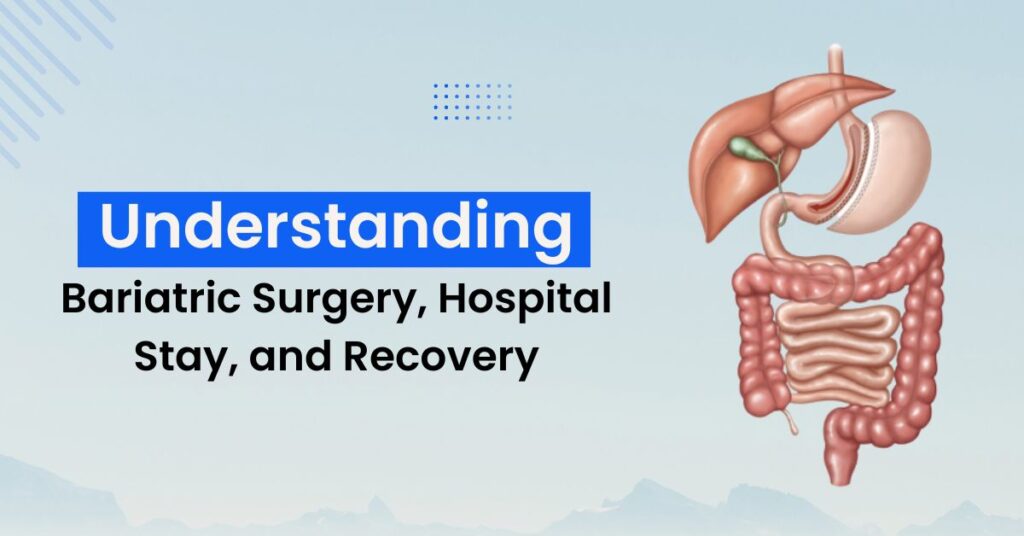
For those who are battling with obesity, bariatric surgery is a strong tool. It is a substantial and frequently life-changing decision. It gives hope for better mobility, better health, and a higher standard of living. Nevertheless, choosing to have bariatric surgery is a serious decision that must be well thought through, taking into account a number of variables such as the length of hospital stay and the recuperation period. We will examine bariatric surgery in great detail in this thorough guide, including a thorough examination of the operations, the duration of hospital stay, and the recuperation process.
Comprehending Bariatric Surgery
Bariatric surgery, also referred to as weight loss surgery, is a group of operations designed to help people lose a large amount of weight by making changes to the digestive system’s structure. These operations function by limiting the stomach’s capacity to store food, decreasing the absorption of nutrients, or doing both at once. Helping people lose weight and keep it off is the major objective of bariatric surgery. This can help with obesity-related health issues like type 2 diabetes, hypertension, and sleep apnea.
Bariatric Surgery Types
Bariatric surgery comes in a variety of forms, each having pros, disadvantages, and factors to take into account. The most typical practices consist of:
Gastric Bypass (Roux-en-Y Gastric Bypass): This operation bypasses part of the stomach and the first segment of the small intestine by forming a little pouch at the top of the stomach and linking it directly to the small intestine. The stomach’s capacity to store food is decreased, and the absorption of calories and nutrients is constrained, following gastric bypass surgery.
Sleeve Gastrectomy: This technique makes a smaller, sleeve-shaped stomach pouch by removing a piece of the stomach. A sleeve gastrectomy limits the quantity of food that may be eaten and suppresses the hormones that cause hunger, which reduces appetite and calorie intake.
Adjustable Gastric Banding (also known as Gastric Band): This procedure involves encircling the upper portion of the stomach with an inflatable band to form a tiny pouch that can only hold a certain quantity of food. To regulate food intake, the band can be tightened or loosened as necessary.
Biliopancreatic Diversion with Duodenal Switch (BPD/DS): This less common treatment reduces the size of the stomach and the amount of nutrients absorbed by the body by rerouting the small intestine and eliminating a section of the stomach.
Length of Hospital Stay
The type of operation done, the patient’s general health, and any complications that may develop during or after surgery are some of the factors that affect how long a patient must stay in the hospital following bariatric surgery. After bariatric surgery, patients should generally anticipate spending one to three days in the hospital, however individual outcomes may differ.
Gastric Bypass: Two to three days are usually needed for recovery following gastric bypass surgery. Medical professionals keep a careful eye on patients during this period to make sure they heal properly and to handle any post-operative issues like pain, nausea, or dehydration. Once a patient can walk comfortably, is well hydrated, and can tolerate a liquid or pureed food, they may be released from the hospital.
Sleeve Gastrectomy: A one- to two-day hospital stay is often required for sleeve gastrectomy surgery. Patients are kept an eye out for any indications of problems like bleeding, infection, or surgical site leakage. They might be sent home to continue recovering if they can handle liquids and are in stable health.
Gastric Banding: Generally, gastric banding surgery is done as an outpatient procedure or requires a single night in the hospital. Following surgery, patients are watched for any potential acute complications and may be released as soon as they feel stable and at ease.
Biliopancreatic Diversion with Duodenal Switch (BPD/DS): This procedure often requires a longer hospital stay of two to four days due to the complexity of the surgery and the potential for post-operative complications. Patients may be discharged once they are able to tolerate liquids and are in stable condition.
Factors Influencing Hospital Stay Length
A number of factors can affect how long a patient stays in the hospital after bariatric surgery:
Surgical Technique: The duration of hospitalisation may vary depending on the type of bariatric treatment carried out and the surgical technique (open or laparoscopic). Compared to open surgery, laparoscopic surgery typically results in a shorter hospital stay because it requires fewer incisions and less tissue trauma.
Patient Status: In order to provide more attentive monitoring and post-operative care management, patients with underlying medical issues or complications may need to stay longer in the hospital. Disorders like diabetes, high blood pressure, or sleep apnea might lengthen the healing period and raise the chance of complications.
Post-Operative Complications: In order to receive the proper care and attention, patients who experience post-operative complications such bleeding, infection, or leakage from the surgical site may need a lengthier hospital stay. For the best results, close observation and quick action are required.
Patient Compliance: Recovery time and the requirement for hospitalisation can be greatly impacted by a patient’s compliance with post-operative instructions about nutrition, activity, and medication adherence. Individuals who adhere to their surgeon’s advice have a better chance of recovering quickly and could even be sent home earlier.
Recovery Process
Following bariatric surgery, recovery is a long process that calls for perseverance, commitment, and support. While recovery times vary from patient to patient, most people can return to their regular activities a few weeks to months after surgery. There are various stages to the recovery process:
Immediate Post-Operative Period (Hospital Stay): Patients receive pain relief and supportive care during the days just after surgery, and they are continuously watched in the hospital for any indications of problems. To aid with their recuperation, patients are usually started on a liquid or pureed diet and are encouraged to walk around.
First Few Weeks: As their bodies acclimatise to the surgical modifications, individuals may have discomfort, exhaustion, and changes in appetite in the first few weeks following surgery. It is imperative that you adhere to the surgeon’s stringent diet plan, which usually consists of moving up from liquids to pureed foods and then to soft solids. During this period, patients should also be careful to drink plenty of water and refrain from physically demanding tasks like heavy lifting.
Weeks to Months: Patients can progressively transition to a regular diet and up their activity levels as they are able to as the weeks go by. Attending follow-up sessions with the surgical team is crucial for tracking progress, addressing any concerns, and making necessary modifications to the treatment plan. Patients may also benefit from participating in support groups or counselling to help navigate the emotional and psychological aspects of weight loss surgery.
Long-Term Recuperation and Lifestyle Modifications: Bariatric surgery is a tool to help with long-term weight loss and better health, not a panacea. Adopting good lifestyle practices, such as consistent exercise, a balanced diet, and continuing medical monitoring, is essential to long-term healing. It is recommended that patients maintain close collaboration with their healthcare providers in order to effectively manage any medical concerns, overcome obstacles that may emerge, and maintain weight loss.
Factors Influencing Recovery
The following variables may impact the course of recovery and results from bariatric surgery:
Procedure Type: The type of bariatric surgery that is done can affect how long it takes to recover; certain procedures call for a lengthier recovery time than others. Gastric bypass and biliopancreatic diversion with duodenal switch (BPD/DS) surgeries, for instance, usually require longer recovery periods because of their intricacy and the possibility of more substantial alterations to the digestive system. On the other hand, because they need fewer significant changes to the digestive anatomy, gastric banding and sleeve gastrectomy procedures might require shorter recovery times.
Pre-existing Medical illnesses: Following bariatric surgery, patients with pre-existing medical illnesses such as diabetes, cardiovascular disease, or respiratory diseases may need more time to recuperate. These disorders may necessitate further monitoring during the healing phase and raise the possibility of post-operative complications.
Age: Another factor influencing recovery time is age, with older patients often recovering more slowly than younger ones. Elderly people may heal from surgery more slowly and have lower physical resilience. However, as many older persons have successfully undergone bariatric surgery and experienced considerable improvements in their health and quality of life, age alone should not be a deterrent to undertaking this procedure.
Nutritional Status: After bariatric surgery, a healthy diet is crucial for promoting healing and recovery. Patients who want to support their weight loss objectives and ensure they get the nutrients they need must follow a strict diet plan that has been recommended by their healthcare professional. Inadequate nutrition might impede healing and raise the possibility of problems.
Making the life-altering decision to have bariatric surgery can have a significant impact on one’s entire quality of life, mental stability, and physical health. For those who are thinking about bariatric surgery, knowing how long the hospital stay will take and how long the rehabilitation process will take is crucial because it helps them set reasonable expectations and them ready for the journey ahead.
The duration of hospital stay and recuperation period may differ based on various aspects such the surgical technique, personal health condition, and complications after the process; however, most patients can anticipate returning to their regular activities in a few weeks to months after the procedure. Patients can achieve long-term success in their weight loss objectives by sticking to dietary and lifestyle suggestions, following post-operative protocols, and asking for help from healthcare providers and loved ones.



